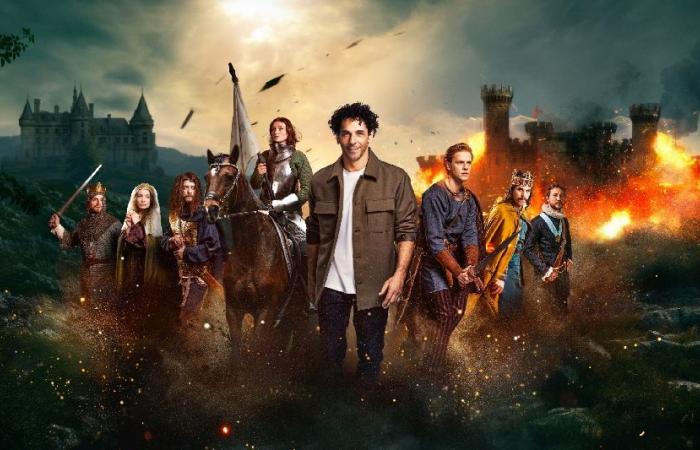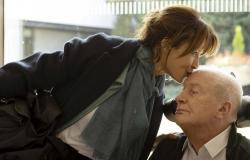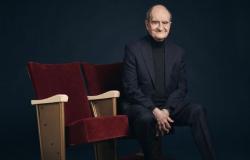
“We are betting on Clovis and Charlemagne in prime time. It’s a strong choice,” says Nicolas Daniel, director of magazines at France Télévisions. He talks about “Our History of France”, the documentary series whose first two episodes are broadcast this Tuesday, October 8, from 9:05 p.m., on France 2.
Inspired by the Danish format The history of Denmark launched in 2017, this ambitious program addresses the destiny of a historical figure in 52 minutes while evoking the daily life of his anonymous contemporaries. In the middle of the reconstructed scenes, Tomer Sisley emerges to provide elements of context or underline the historical importance of this or that event.
“Certain eras hold up a mirror to the questions we ask ourselves today. For example, at the time of Clovis, the Syrians were accused of bringing a religion, the Christian religion, accused of destabilizing the kingdom,” says Nicolas Daniel. The result is very cinematic, often epic. In short, it’s a new way of telling the story on TV.
The ITV Studios production teams worked with a committee of expert historians of the periods concerned. “We interviewed others to provide a multiplicity of points of view and elements of information, contextualization, insights into living conditions, male-female relationships, etc. », Says producer Cécile Lévy.
“Compared to what I learned at school, things have changed”
Thus, the first episode, dedicated to Vercingétorix, recalls that Gallic women were far from occupying a subordinate position in society, that they had financial autonomy and that they had the right to divorce while retaining their property. .
A historian also points out that it was common for Gallic warriors to have carnal knowledge without this generating hostility. Vercingétorix, for his part, appears with short hair and without a large moustache, far from the representations which permeate the collective imagination and school textbooks. “History is a discipline in movement, it is not something fixed,” insists Cécile Lévy. Even compared to what I learned at school, things that historians have recently realized have already changed. » It must therefore be told.
One of the challenges of the project was to “deconstruct a certain number of myths coming from the National Romance, that is to say the way in which history has been rewritten to put it at the service of certain ideologies, nationalist or other , and influence the present with regard to this rewriting,” indicates Nicolas Daniel. So forget what you think you know about The Song of Roland. “Contrary to what the text says, he never faced Saracens but Basques. There was a subsequent rewriting of history which aimed to mobilize the French against the Saracens,” continues the director of public service magazines.
“Some have a vision of history aimed at dividing”
“Our history of France”, therefore tells, to use the words of Nicolas Daniel, “a national story”. “We offer a story that brings people together, which is not controversial. We will certainly be criticized for this since some have a vision of history aimed at dividing. A certain number of people and media want to explain to us that it was better before, that certain people are not part of France, etc. There has always been that, historians have always lived with that. »
Damien Piscarel, deputy program director in charge of documentaries at ITV Studios, procrastinates somewhat: “We are aware that history is a human science. We have done everything so that there is no debate about what we can say within the six episodes. »
In addition to Vercingétorix, Clovis and Charlemagne, Saint Louis, Joan of Arc and Henry IV are on the menu for this first season which, if successful, calls for others. 20 Minutespartner of “Our History of France”, has not watched all the episodes, but there is no doubt that the way in which certain figures will be addressed, in such an exposed program, will make the supporters of a rigid French history cringe. , necessarily white, necessarily Christian.
“Putting history at the center of debates on our identity”
“We will be happy to debate with them if they wish. But I think that the criticisms that could be made by some will be less intended to debate than to galvanize their troops around the idea that France Télévisions has biases and ideological biases, predicts the director of France Télévisions magazines. If there are people who want to believe it, there is nothing we can do about it except to remind them of the reality of our work. »
Tomer Sisley is aware that telling the story involves “a responsibility”. “What are we saying and why are we telling it? How does this resonate with our lives today? My father, a history buff, instilled in me that understanding history allows us to better understand today and better understand tomorrow,” confides the actor.
The objective of France Télévisions, through these six episodes, is to make the story “closer to us” by bringing together the widest possible audience in terms of ages, social classes and origins. It is about “putting history at the center of debates on our identity, on the way in which we must form a nation, interact with each other”, summarizes Nicolas Daniel. And to conclude: “We make this show so that people talk about history. Debating history sparks an exchange, it creates democracy. »





